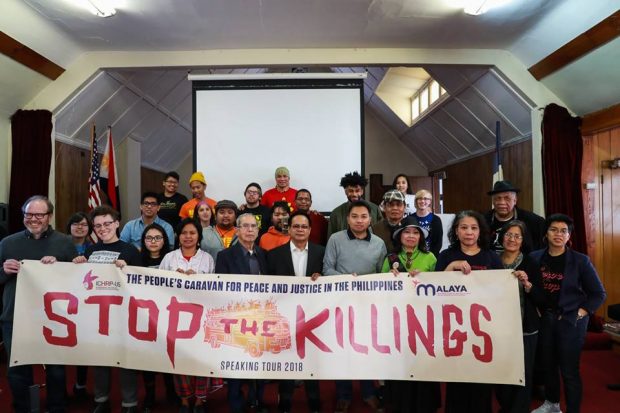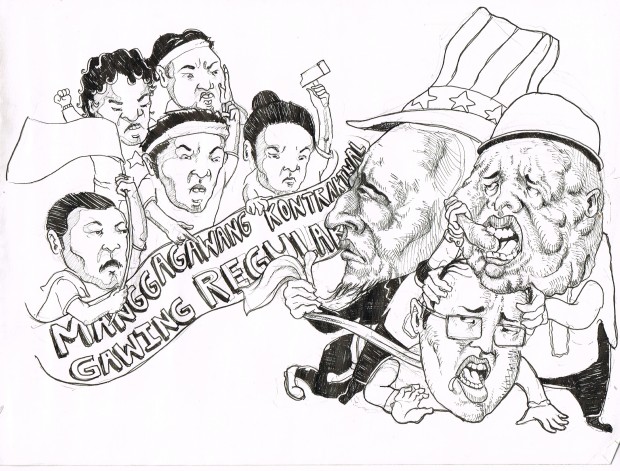A plaque honoring Philippines’s Kilusang Mayo Uno (KMU) was installed at the Haymarket Square in Chicago, Illinois, USA last May 1 at the monument honoring workers whose deaths led to several labor reforms, including the implementation of an eight-hour work day.
The installation of the plaque was organized by the Illinois Labor History Society.
Raymond Palatino Bagong Alyansang Makabayan represented KMU during the activity. Below is the text of Mong’s speech:
= = = = =
Salute to the working class of the United States! Salute to all working peoples of the world! Mabuhay!
It is an honor to represent the Kilusang Mayo Uno or May First Movement of the Philippines.
Today, we honor the Haymarket workers whose martyrdom did not only pave the way for labor reforms, but more importantly, it empowered and inspired the growth of the labor movement all over the world.
So powerful was the legacy of May One that it eventually became the International Workers Day.
The Philippine labor movement acknowledged the heroism of the Haymarket martyrs when its largest and most militant labor federation chose the name Kilusang Mayo Uno or May First Movement to unite all workers in the Philippines and lead the struggle of the working class.
KMU was established to strengthen the ranks of Filipino workers at a time when the country was under a dictatorship. KMU led the workers in resisting tyranny and linked arms with the farmers, the urban poor, and other freedom-loving Filipinos in ousting a dictator from power.
Since then, the KMU has been at the forefront of the labor movement, and it has consistently and bravely asserted, without compromise, the just demands of workers for higher wages, decent work, safe workplaces; and it has been a strong voice in pushing for democratic rights, an end to feudal oppression in the rural regions of the Philippines, the resistance against foreign control of the local economy, and the realization of the people’s national democratic aspirations.
For almost four decades now, the KMU has been an influential force in the people’s struggle for real democracy and lasting peace in the Philippines.
And so it is fitting that, as we place a KMU marker here in Chicago, we dedicate this in honor of all who devoted the best years of their lives, many of them even sacrificed their lives, in pursuing the revolutionary struggle for national democracy.
This plaque is also for the Filipino migrant farmers who arrived here in the US in the early 20th century. Some of them would become pioneers in union organizing. Their work is remembered today as we continue to fight for immigrant rights and the improvement of conditions of all migrant workers in the US.
This is for the assembly workers in the Philippines’ export processing zones who are toiling in sweatshop conditions, the plantation workers of Mindanao who are herded in militarized camps, the service sector employees denied of benefits, the migrant workers who are forced to be separated from their families because of poverty, underdevelopment, and unjust immigration policies. This is for all the working classes who do not surrender and who continue to march forward to fight for change.
This is for the labor organizers in the Philippines who are fighting a rising dictatorship amid nonstop attacks by state forces. Some of them are in prison yet the only crime they committed was to promote the welfare of workers.
In response, we proudly assert that union organizing is not a crime. Empowering the grassroots is not a crime. Standing up for migrant rights is not a crime.
The real criminal act is the exploitation of the working class, the greedy appropriation of profits and surplus value while workers are subjected to slave-like relations, and the collusion of big capitalists and corrupt politicians in violating labor rights.
KMU stands in solidarity with the American working class in challenging the neoliberal economic policies that drive down wages, destroy unions, and harm the health and well-being of workers.

Raymond Palatino (front row, 5th from right) with members of the Illinois Labor History Society. (Photo by Ciriaco Santiago III, used with permission)
KMU joins all workers in the world in smashing this inhumane system that perpetuates oppression and inequality.
The capitalists have money, the police, the courts, and dirty politicians; but the workers are stronger because we have unity and solidarity and the peoples of the world are one with us in building a better future, a beautiful tomorrow where there is real peace, justice, democracy, and respect for human dignity.
Long live the working class! Mabuhay ang uring manggagawa!


